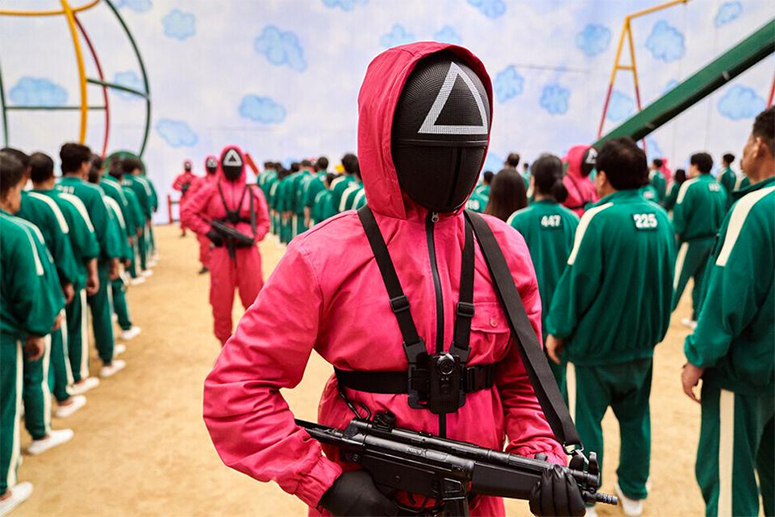Red light, green light
Those of you who smiled when you read the title know what I’m talking about: none other than Squid Game, which is set to become the most viewed Netflix production of all time.
I’m still groggy from two nights of binge-watching, after making sure that my wife Beng was already asleep. She’s a Koreanovela fan—and I guess you can call me a reluctant convert, having little choice but to follow the travails of star-crossed lovers getting wet in the rain, slurping ramyeon, or running slow-motion into each other’s arms on a beach at sunset.
But for some reason, Beng likes romance, not gore, and she steadfastly refused to reciprocate my constancy by watching Squid Game with me.
I think it will be more fun if, in the 2022 elections, we took a special poll to vote for 456 politicians, public officials, generals, big-time druglords, profiteers, car-loving pharmaceutical executives, troll masters, and other crooks to constitute the players.
She can’t understand it when I explain that violence relaxes me, releases the lion in my pussycat, exhausts my latent desire to pulverize my enemies and split a few skulls, and leaves me refreshed for another day of, well, typing.
Beng’s favorite expression — which she uses several times a day, usually when watching the news or some TV drama, or when we’re driving past a mangy dog — is “Kawawa naman!” If she were a street in UP Village, it would be “Mahabagin.”
That’s why, you see, she couldn’t possibly get through even one episode of Squid Game. The violence hadn’t even begun — Gi-Hun was just getting warmed up as the quintessential loser, trying to play good dad to his 10-year-old daughter — when I heard Beng mutter her first “Kawawa naman!”
Rather than subject myself to a night-long litany of laments for pitiful souls, I agreed to switch channels and watch contestants try to outdo each other in applying hideous makeup onto hapless models. Beng couldn’t see me wincing in the dark, my tender aesthetics feeling the vicious assault of mascara wands and lipstick applicators.
But let’s get back to the show. After its release less than a month ago, Squid Game became a global sensation in no time at all, and it’s easy to see why.
Even the venerable Washington Post intones that “Squid Game (is) much more than a gory dystopian thriller. It’s a haunting microcosm of real life, unpacking the many implications of inequality, which has in some way drawn each of the players to this battle for their lives.”

Parents will be horrified to find that their kids can buy Squid Game soldier outfits online, complete with black masks and pink track suits, submachine guns optional. (When I clicked the link, I got a message saying “Sorry! This product is no longer available.”
That can mean only one of two things: first, that the seller developed a conscience and pulled the item out, or second, that stocks were sold out — you win a prize of a trip to Busan if you guess the correct answer.)
So let’s get this clear, especially if you’re thinking of gathering the family around the TV for some quality time watching people’s shirts turn a splotchy red: Squid Game isn’t for kids, okay? The whole point of it is that it wants people to think they’ll be playing kids’ games — which is true, except that (this is hardly a spoiler now, after all the publicity), the losers die.
I’m not going to go into the kind of sociological soul-searching that will be the stuff of dissertations over the next five years, with titles like “Competition Theory: Neoliberalism, the State, and Squid Game in the Philippines, 2016-2022.” (If you want an honest-to-goodness, semi-academic chat about the show, the UP Korea Research Center will be hosting an online forum on Squid Game on Friday, Oct. 15, at 3:30 p.m.)
I’m tempted more by the idea of staging our version of the game here, with life’s “winners” instead of losers as players, for a change. The reward will be — let’s see, what might the rich and powerful still want that they don’t already have?
More money? Too easy; they have enough stashed away in the British Virgin Islands (legally, mind you —they did nothing wrong) to last three lifetimes.
More happiness? Which means what —more likes on Instagram, more cover shots in the glossies, Ivy League placements for the kids, one mistress more, a new Lamborghini Huracan, another Patek Philippe, a new calling card saying “Senator of the Republic,” or something even loftier? Eternal life? Some families already have that — 35 years after EDSA, you-know-who are still around.
How about this: the prize will be absolution for one’s sins, which technically will qualify one for entry into heaven, no matter what terrible things one may have done in life — stolen billions, murdered thousands, lied 90% of the time, cursed God and half the saints, you supply the rest.
It could be voluntary, of course, because most of the players we’d like to nominate will never admit to sinning nor to needing forgiveness; they have willfully accepted damnation, and their choice must be respected.
But I think it will be more fun if, in the 2022 elections, we took a special poll to vote for 456 politicians, public officials, generals, bigtime drug lords, profiteers, car-loving pharmaceutical executives, troll masters, and other crooks to constitute the players.
How thrilling it would then be to put on a black mask, look over the track-suited multitude, appreciate the anxiety in their puzzled faces, and announce: “Green light!... Red light!” Boom. Boom. Boom.
Sorry, Beng, hindi sila kawawa, and I could watch this all day.


